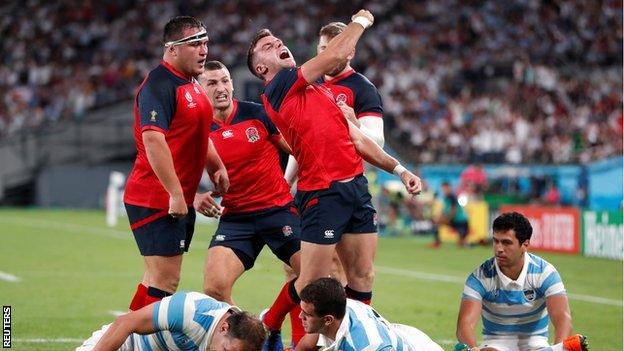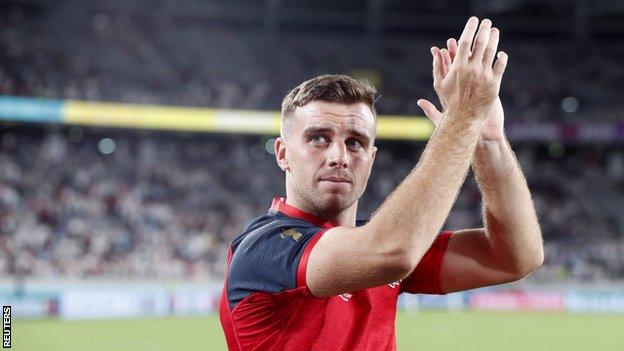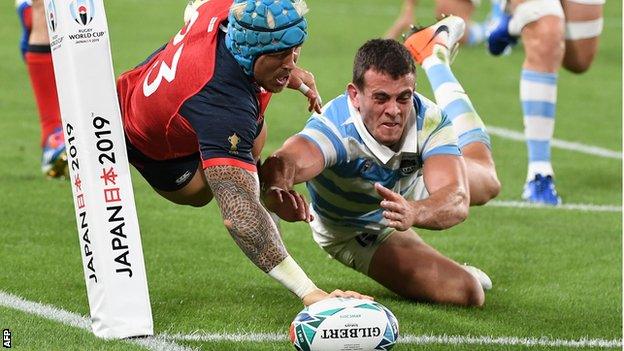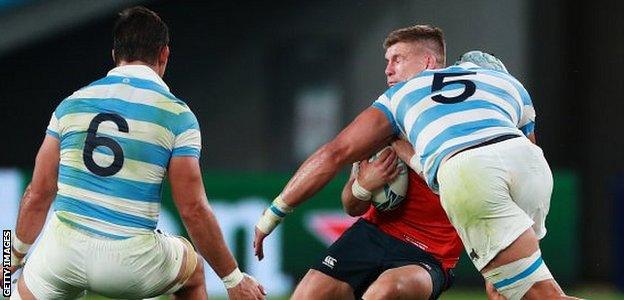George Ford: England's first-choice fly-half after impressing against Argentina?
- Published
- comments

Fly-half George Ford scored England's fourth try to cap an influential display in Tokyo
Three games, three bonus-point wins, straight into the knockout stages. England's World Cup continues to build, even as the sense remains that this is still the phoney war rather than anything close to a decisive push.
With a start like that very few talk about changing a team. George Ford will hope it stays that way, because so far in this tournament he has done everything he can to convince head coach Eddie Jones to keep a faith that too often in the past has wavered.
Just as there will be those who put caveats next to each of England's victories out here in Japan - two comparative minnows, then an Argentina team with a horrible record this year and only 14 men from the 18th minute onwards - so there are critics who leave an asterisk by Ford at the very highest level.
A fly-half who can do everything a modern 10 should do - find space, spot gaps, put runners into them; kick to clear, kick to tighten the screw - has not yet done as much as it appeared he would when first gliding his way into the England team.
And so when the big games come, when the big runners come charging down his channel, coaches have sometimes twitched.
Stuart Lancaster did it at the last World Cup. Ford, a certain starter throughout the previous two years, the standout performer in an impressive victory in Cardiff in the preceding Six Nations, ditched when Wales came calling at Twickenham in the tournament itself, left out again for the decisive game that followed against Australia.
Warren Gatland picked four others ahead of him when the British and Irish Lions travelled to New Zealand two years ago. Jones got through the Six Nations this year using Ford exclusively from the bench.
Jones has never cared for convention, nor the narrow concerns of his players. So you wonder now whether he will twitch again as France come into view next week and the Wallabies, probably, lie in wait another week further on.

Ford's try helped to guarantee England's place in the quarter-finals, but his place in the team may not be secure
It seems cruel for a man with 62 caps before his 27th birthday, but it is more than simply about size and brute force in a game sometimes too obsessed with both.
Ford at his best plays flat to the line and excels at taking the ball to it. He can commit defenders and delay his pass until the angles and opportunities come together in harmony. He logs the tired men in front of him and has the short flare of acceleration to break into the subsequent holes.
He showed all that against Argentina. It was his pass that led to Jonny May's opening try for England and his call that sent the ball left for Elliot Daly's at the other end of the half. His kicking from hand pinned the Pumas back and his try five minutes into the second period was all about opportunism and a little jet-heeled dart.
Some of that instinct seemed lost a year or so ago. He looked more cautious, that ability to hold time in a frantic moment just fractionally off. Had Henry Slade not damaged his knee in the summer then Ford may not even have started against Tonga.
Now Slade is fit again, as is Jack Nowell. Jonathan Joseph is once again showing glimpses of his own neglected abilities. And Manu Tuilagi is as undroppable as Farrell.
There is real possibility he might be crowded out once more.

Jack Nowell scored a superb try on his return to the international team after injury
Jones might call it rotation. Slade needs game time after only two appearances off the bench in the past two months. So too does Nowell, characteristically impactful as a replacement himself in Tokyo on Saturday.
The head coach has given nothing away when asked about the 10-12 axis over the past two weeks. "You can read into it that we think George and Owen are the right combination for this specific match," has been his forward-defensive of a response.
But you wonder. Farrell was out of sorts against Argentina, missing four consecutive kicks at goal, at periods in the second half looking caught between options as if still stunned by Tomas Lavanini's first-half shoulder charge, even as Jones insisted there was no issue with concussion.
Yet Jones kept him on, having taken his other great talisman Billy Vunipola off at the first hint of an ankle injury.
Farrell eventually found his kicking range and celebrated Nowell's late, bullocking try with a vigour that spoke of clarity. It made Jones' post-match interviews a little easier. If he does have to choose between the two old friends, he almost always goes one way.

Lock Tomas Lavanini was sent off in the first half for smashing his shoulder into Owen Farrell's head
Maybe it is a nice sort of problem for the Australian to have.
While the game was effectively killed by Lavanini's early red card, England had beaten the same opposition when facing similar circumstances themselves at Twickenham two autumns ago. Just as they found a way then after Daly's early dismissal, they eventually re-established the rhythm they required here after trying to force it too much for much of the last 40 minutes.
If Vunipola is fit then Jones has positives wherever he chooses to look - 31 players, probably, to choose from in a tournament where attrition often tells; a set-piece that looks strong; a defence that have conceded only two tries in their past four Tests.
With his try in Tokyo, May has now scored 15 since the beginning of last year, more than any other player in international rugby in that time. Tom Curry - the 21-year-old infamous in the England camp for sleepwalking at night - continues to charge into his future, an open-side who started on the blind-side and finished at eight looking perfectly happy in each position.
The driving maul continues to spew tries. The discipline is tight, only seven penalties given away and not one player carded as other nations have struggled to adjust.
It all points forward. It always should have done, in a World Cup that has gifted England an extended warm-up. Now for the hardest yards. Now for the games that can make a player indispensable.

